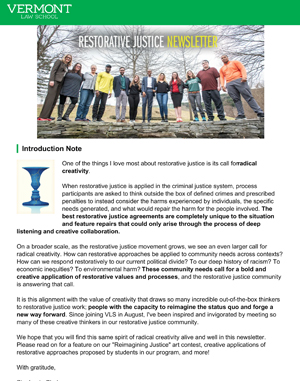Animal law and policy has had a presence at Vermont Law and Graduate School (VLGS)—and in its renowned Summer Session—for decades. Over the years, animal law and policy offerings have grown with new degree programs. Join us to learn from accomplished scholars and practitioners this summer in beautiful Vermont!
Open to students, professionals, and lifelong learners from across the country and the world, this summer’s animal law courses offer opportunities for anyone interested in the field—whether you’re exploring if studying animal law and policy is the right path for you, an undergraduate student considering a law or master's degree, looking to up your game in a related field, committed to becoming an animal advocate, considering a dual degree, or a life-long learner.
For students enrolled at other law schools, this is an opportunity to take advantage of additional animal law course offerings and meet leaders in the field. Students can take a single 4-day intensive course, come for a couple weeks, or spend the whole summer studying at VLGS. Those who don’t need course credits can choose to audit courses for just $400 per credit ($200 per credit for VLGS alumni). Vermont Bar Association Continuing Legal Education (CLE) credit is available for all summer courses.
This summer’s animal law and policy courses include:
-
Animals and the Law: May 13-June 30 (online), taught by Will Lowrey. This course considers the tensions inherent in trying to serve the needs of humans and animals, plus constitutional limitations of justifiability, due process, and First Amendment guarantees. Students will become familiar with litigation tools commonly used in animal law practice.
-
Science of Animal Law and Policy: May 28-June 13 (residential), taught by Delcianna Winders and Lori Marino. Scientific literacy is a cornerstone of advancing successful legal and policy efforts on behalf of nonhuman animals. This course will provide an overview of critical and foundational scientific concepts, scientific thinking and culture, and scientific vocabulary, and an introduction to how to use this information to inform effective animal protection law and policy efforts. This course is open to undergraduate students.
-
Ocean and Coastal Law: May 28-June 13 (residential), taught by Michael Jasny, Elizabeth Lewis, and Sarah Reiter (JD’13). Long neglected by lawmakers despite its essential ecological functions, the marine environment has increasingly been the focal point of conservation and natural resource management efforts. As a foundation for studying the laws that govern the marine environment, the course considers the natural components of estuarine, coastal, and marine ecosystems and the current conservation issues confronting them. We will review domestic and international laws and treaties relating to coastal management, pollution, protected areas, endangered species, fisheries, marine mammals, wetlands, marine spatial planning, and offshore energy resources, and examine alternative approaches to ensure the conservation and sustainable use of marine resources. The course considers the effectiveness of these legal regimes in providing rational and comprehensive management and protection of marine resources in the face of emerging threats from climate change, crashing fish stocks, and energy shortages, focusing on current events such as the Gulf of Mexico oil spill, the International Whaling Commission debate over commercial whaling, and climate change threats to the Arctic. This course is open to undergraduate students.
-
Undercover Investigations of Animal Operations: May 30-June 2 (residential), taught by Meg York (JD'15): What are undercover investigations? Why do animal advocacy organizations conduct them? In this course, students will explore a variety of legal considerations as they relate to conducting undercover investigations of animal operations. Specifically, students will examine the intersection of criminal law, tort, and ethical issues, as well as what does and does not constitute actionable animal cruelty. We will discuss evidentiary issues, taking action/pursuing litigation, and corporate liability. We will examine how undercover investigations have changed the legal landscape for animals as well as the methods by which the industry has pushed back at this animal advocacy tactic. Throughout the course, we will discuss the ways in which undercover investigations and resultant prosecutions implicate social justice issues, assessing whether the stated goal of deterrent effect outweighs the potential disparate impact on individual low-wage workers.
-
Animal Welfare Law: June 17-30 (residential), taught by Dr. Heather Rally and Mary Hollingsworth. In recent years, a broad and rapidly evolving field of law has developed concerning the welfare of animals that are used for a variety of human purposes, including food, entertainment, research, and companionship. Animals used for these purposes often endure a wide range of abuses that diminish animal welfare while also impacting humans.
Public views about such uses of animals are rapidly changing, as evidenced by recent developments including Ringling Bros. shuttering its iconic circus after a decade of falling ticket sales, SeaWorld ending orca breeding after falling profits and stock prices, the National Institutes of Health ending its support of biomedical research on chimpanzees, the enactment of laws prohibiting the maintenance of cetaceans in captivity, changes in consumerism and human consumption away from animal products, and other developments. A unique aspect of the class will be to combine traditional principles of “animal welfare” laws and advocacy with laws typically applied in the “wildlife conservation” context, such as the Endangered Species and Marine Mammal Protection Act. Through a survey approach, this class will examine the role of law in these and other key steps forward in understanding and reforming the relationship between humans and animals and improving the condition of animals maintained for human profit and entertainment.
Students in the class will come away with an understanding of the role of legal institutions and regimes in promoting animal welfare, and how they are—and are not—working. Past and current litigation, regulatory, and legislative efforts on behalf of animal welfare will be covered, with case studies and current developments.
-
Biodiversity Protection: July 8-July 21 (residential), taught by David Takacs. Across the globe, wildlife and its habitat are increasingly threatened by human-caused habitat destruction, exploitation, poaching, illegal trade, invasive species, disease, and climate change. This course examines what biodiversity is, the growing threats to it, and U.S. and international laws to combat those threats. The course focuses on statutes, case law, environmental ethics, and current controversies to highlight legal, scientific, and political strategies for protecting biodiversity. Particular emphasis is placed on the U.S. Endangered Species Act.
-
The Farm Bill: July 22-August 4 (residential), taught by Chris Adamo (JD'04) and Jonathan Coppess. American farm and food policy has long been the subject of strenuous debate and criticism. In recent years, prominent criticism has come from a movement of consumer and environmental interests concerned that the way we eat and how we support producers impacts our health, natural resources and the environment. Other interests raise concerns that about Federal spending and government footprint. Regardless of the reason, all of them look to the farm bill. The farm bill, however, is difficult; hard to understand and challenging to change policies that have proven incredibly resilient over many decades. The class is an attempt to explain the farm bill; the history and development of the policies enacted but with an eye on how policy has changed and been reformed over the years due to changing stakeholder needs. Students will examine many of policies before Congress -- from crop insurance to conservation to food assistance -- with a strong emphasis on the political trends and motivations. The goal of the class is to inform students about the range and depth of Federal farm and food policy, while also developing a better understanding of the historical, economic, political and process-based forces in Congress; the keys to current policies and to the development and direction in the future. Some commentators have suggested that eating is an agricultural act but that consumers are often disconnected from farmers. If eating connects us to nature through farming, this class connects students to farming and nature through policies designed in the halls of Congress and the executive branch.
-
Environmental Crimes: July 22-August 4 (residential), taught by Deborah Harris. The field of Environmental Crimes includes a wide array of federal statutes directed at preventing pollution, safeguarding human health and natural resources, and preserving fish, wildlife, and plants. This area of law continues to grow in importance as we battle global issues from climate change to the extinction of iconic species. It is also a topic that brings out strong emotions—from cries for more regulation after catastrophic events to complaints of “over-criminalization” when corporate profits dip. This course will provide an overview of the major U.S. environmental statutes and the impact of certain doctrinal and policy issues on the application of these laws. We will cover both the national and international infrastructure for environmental enforcement. We will also address the use in environmental prosecutions of general crimes such as conspiracy, false statements, fraud, and obstruction of justice; prosecutorial discretion guidelines; sentencing issues; and litigation pitfalls to avoid.
-
Farmed Animal Advocacy Clinic: May 28-August 2 (residential and online), taught by Laura Fox. Students in the Farmed Animal Advocacy Clinic (FAAC) work under the close supervision of clinical faculty to develop and execute legal strategies to further the interests of farmed animals. Students represent clients directly, including national and local organizations as well as individuals, in legal matters aimed at improving the treatment and status of farmed animals, including litigation, regulatory work, and legislation and policy. Students are given a leadership role and are involved in every aspect of their assigned matters, which are selected to maximize learning opportunities while also effecting the most change for farmed animals.
FAAC students will learn a wide range of legal advocacy skills that are central to animal law but also transferable beyond animal law, including navigating legal ethics issues that arise in the context of impact litigation, building and dealing with coalitions and clients with divergent interests, client outreach and communication, developing relationships with experts, and the relationship between legal and media strategies.
This unique opportunity is open to law, LLM, and master's students from other schools for 4-6 credits, and undergraduate students are welcome to intern. Please email Logan Volpe for more information at lvolpe@vermontlaw.edu.
Numerous additional summer courses can help students in their animal law and policy work. Visit VLGS’s summer session website to learn more about the program and how to register.
Hot Topics Series
In addition to the course lineup, VLGS’s Environmental Law Center is also hosting numerous animal law and policy events this summer, including lunchtime Hot Topics lectures each Tuesday and Thursday online at vermontlaw.edu/live.
Thanks to generous funding from the American Society for the Prevention of Cruelty to Animals (ASPCA), Hot Topics presentations will also be delivered by two summer animal law media fellows.
Hot Topics talks are free and open to the public in person, with Vermont Bar Association CLE credit available, and will also be livestreamed. The full line-up for this summer will be posted online soon.


















